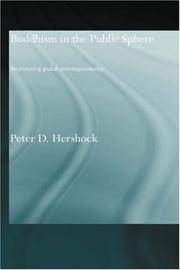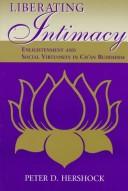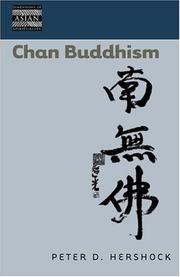| Listing 1 - 10 of 47 | << page >> |
Sort by
|

ISBN: 0415770521 0415544432 1135986746 9786610549122 1280549122 0203970128 1135986738 Year: 2006 Publisher: London : Routledge,
Abstract | Keywords | Export | Availability | Bookmark
 Loading...
Loading...Choose an application
- Reference Manager
- EndNote
- RefWorks (Direct export to RefWorks)
Annotation
Buddhism and the social sciences. --- Globalization --- Religious aspects --- Buddhism. --- Buddhism and politics. --- Buddhism and social problems. --- Social problems and Buddhism --- Religion and sociology --- Social history --- Social problems --- Buddhism --- Politics and Buddhism --- Political science --- Political aspects --- buddhist --- perspective --- attentive --- mastery --- teaching --- moral --- clarity --- contributory --- virtuosity --- terms
Book
ISBN: 0585316775 9780585316772 1438406606 Year: 1999 Publisher: Albany, N.Y. : State University of New York Press,
Abstract | Keywords | Export | Availability | Bookmark
 Loading...
Loading...Choose an application
- Reference Manager
- EndNote
- RefWorks (Direct export to RefWorks)
"By uniquely using Buddhist teachings, Reinventing the Wheel assesses the personal and communal costs of our global economic and technological commitments. Hershock urges reinvention of the technological "wheel," and, at the same time acknowledges the need for new forms of practice suited to our rapidly evolving social, political, and economic circumstances. His persuasive presentation urges the skillful spinning of a new "wheel of the dharma.""--Jacket.
Information technology --- Buddhism --- Buddhist doctrines --- Buddhist theology --- Lamaist doctrines --- Religious aspects --- Buddhism. --- Social aspects. --- Doctrines.

ISBN: 0585034214 9780585034218 0791429814 0791429822 1438406592 Year: 1996 Publisher: Albany, NY State University of New York Press
Abstract | Keywords | Export | Availability | Bookmark
 Loading...
Loading...Choose an application
- Reference Manager
- EndNote
- RefWorks (Direct export to RefWorks)
Zen Buddhism --- Spiritual life --- Religion --- Philosophy & Religion --- Buddhism --- Spiritual life (Zen Buddhism) --- Doctrines. --- Zen Buddhism. --- Doctrines --- S13A/0320 --- China: Religion--Chinese Buddhism: Chan Buddhism (incl. texts)
Book
ISBN: 1438444605 9781438444604 1438444591 9781438444598 9781438444604 Year: 2012 Publisher: Albany
Abstract | Keywords | Export | Availability | Bookmark
 Loading...
Loading...Choose an application
- Reference Manager
- EndNote
- RefWorks (Direct export to RefWorks)
Diversity matters. Whether in the context of ecosystems, education, the workplace, or politics, diversity is now recognized as a fact and as something to be positively affirmed. But what is the value of diversity? What explains its increasing significance? Valuing Diversity is a groundbreaking response to these questions and to the contemporary global dynamics that make them so salient.Peter D. Hershock examines the changes of the last century to show how the successes of Western-style modernity and industrially-powered markets have, ironically, coupled progressive integration and interdependence with the proliferation of political, economic, social, cultural, and environmental differences. Global predicaments like climate change and persistent wealth inequalities compel recognition that we are in the midst of an era-defining shift from the primacy of the technical to that of the ethical. Yet, neither modern liberalism nor its postmodern critiques have offered the resources needed to address such challenges.Making use of Buddhist and ecological insights, Valuing Diversity develops a qualitatively rich conception of diversity as an emerging value and global relational commons, forwarding an ethics of interdependence and responsive virtuosity that opens prospects for a paradigm shift in our pursuits of equity, freedom, and democratic justice.
Difference (Philosophy) --- Buddhist ethics. --- Philosophy --- Religious ethics

ISBN: 0824827805 0824828356 Year: 2005 Publisher: Honolulu (Hawaii) : University of Hawaii press,
Abstract | Keywords | Export | Availability | Bookmark
 Loading...
Loading...Choose an application
- Reference Manager
- EndNote
- RefWorks (Direct export to RefWorks)
Zen Buddhism --- History.
Book
ISBN: 1438444583 9781438444581 Year: 2012 Publisher: Albany (N.Y.) : SUNY Press,
Abstract | Keywords | Export | Availability | Bookmark
 Loading...
Loading...Choose an application
- Reference Manager
- EndNote
- RefWorks (Direct export to RefWorks)
Book
ISBN: 113598669X Year: 2006 Publisher: Taylor & Francis
Abstract | Keywords | Export | Availability | Bookmark
 Loading...
Loading...Choose an application
- Reference Manager
- EndNote
- RefWorks (Direct export to RefWorks)
Book
Year: 2006 Publisher: [Place of publication not identified] : Taylor & Francis,
Abstract | Keywords | Export | Availability | Bookmark
 Loading...
Loading...Choose an application
- Reference Manager
- EndNote
- RefWorks (Direct export to RefWorks)
The core teachings and practices of Buddhism are systematically directed toward developing keen and caring insight into the relational or interdependent nature of all things. Hershock applies Buddhist thought to reflect on the challenges to public good, created by emerging social, economic, and political realities associated with increasingly complex global interdependence. In eight chapters, the key arenas for public policy are addressed: the environment, health, media, trade and development, the interplay of politics and religion, international relations, terror and security, and education. Each chapter explains how a specific issue area has come to be shaped by complex interdependence and offers specific insights into directing the growing interdependence toward greater equity, sustainability, and freedom. Thereby, a sustained meditation on the meaning and means of realizing public good is put forward, which results in a solid Buddhist conception of diversity. Hershock argues that concepts of Karma and emptiness are relevant across the full spectrum of policy domains and that Buddhist concepts become increasingly forceful as concerns shift from the local to the global. A remarkable book on this fascinating religion, Buddhism in the Public Sphere will be of interest to scholars and students in Buddhist studies and Asian religion in general.
Book
Year: 2006 Publisher: [Place of publication not identified] : Taylor & Francis,
Abstract | Keywords | Export | Availability | Bookmark
 Loading...
Loading...Choose an application
- Reference Manager
- EndNote
- RefWorks (Direct export to RefWorks)
The core teachings and practices of Buddhism are systematically directed toward developing keen and caring insight into the relational or interdependent nature of all things. Hershock applies Buddhist thought to reflect on the challenges to public good, created by emerging social, economic, and political realities associated with increasingly complex global interdependence. In eight chapters, the key arenas for public policy are addressed: the environment, health, media, trade and development, the interplay of politics and religion, international relations, terror and security, and education. Each chapter explains how a specific issue area has come to be shaped by complex interdependence and offers specific insights into directing the growing interdependence toward greater equity, sustainability, and freedom. Thereby, a sustained meditation on the meaning and means of realizing public good is put forward, which results in a solid Buddhist conception of diversity. Hershock argues that concepts of Karma and emptiness are relevant across the full spectrum of policy domains and that Buddhist concepts become increasingly forceful as concerns shift from the local to the global. A remarkable book on this fascinating religion, Buddhism in the Public Sphere will be of interest to scholars and students in Buddhist studies and Asian religion in general.
Book
ISBN: 9780824845810 Year: 2004 Publisher: Honolulu
Abstract | Keywords | Export | Availability | Bookmark
 Loading...
Loading...Choose an application
- Reference Manager
- EndNote
- RefWorks (Direct export to RefWorks)
| Listing 1 - 10 of 47 | << page >> |
Sort by
|

 Search
Search Feedback
Feedback About UniCat
About UniCat  Help
Help News
News